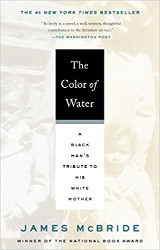James McBride’s latest novel takes place on Chicken Hill, the low-income section of Pottstown, PA. In the 1910s, its inhabitants are primarily Jews and African Americans. But by the 1930s, almost all residents are African American — except for Moshe and Chona, a white Jewish couple who own and operate The Heaven & Earth Grocery Store. Chona was raised in this store and has decided to keep it rather than leave, as the rest of the Jews have; and, as a result, she’s built loving relationships with the Black folk in town. When they call on her to hide a young disabled boy from authorities who want to put him in a mental institution, she quickly takes up the cause.
There are a number of novels that examine the relationships between Jews and African Americans, but few do so as expertly and elegantly as McBride’s. After years of cultivating warm relationships with their African American neighbors, the Jews move away to be nearer to the white Christians in the “better” part of town. They become wary of the Black folk, seeing proximity to them as a stain that will keep them from advancing out of their social class. The African Americans recognize the Jews’ attitude toward them and become resentful. Of course, there’s Chona, who, with her immense love and compassion, transcends this divide. Even still, there are those on Chicken Hill who don’t trust her kindness and charity. Her husband Moshe has his concerns, too: is it worth it, he asks her, to keep operating the store when they have the means to move out and live in a “better” neighborhood? These many conflicting outlooks intersect to create a robust picture of interracial relationships at a pivotal time in American history.
Early in the book, Dodo, the boy whom Chona is meant to protect, gets taken to the mental institution. This propels the novel into its second act: plotting and ultimately executing a rescue mission. Many communities work together — not just the Jews and the African Americans on Chicken Hill, but also a group of African Americans known as the Lowgods, a group that doesn’t want to associate with the other African Americans. They feel that those living on Chicken Hill are too much like the white folk, that they reject their African heritage. Inside the mental institution, living conditions are terrible, and a child-predator Lowgod works on the floor on which Dodo’s being housed — all of which adds pressure for the characters to act fast.
These characters are just as compelling as the plot; most would be worthy of having a novel centered on them. There’s Paper, a Black woman who’s beloved by all the men on Chicken Hill and is the community’s primary source of news. One morning a week, she comes to the Heaven & Earth Grocery Store to share her gossip, consistently gathering together a large crowd. There’s Malachi, a Hasidic immigrant from Eastern Europe who’s known for his incredible dancing and who, unlike Moshe, believes that Black people have it better in America than Jews because “[a]t least they know who they are.” The novel cycles between points of view, allowing for Paper, Malachi, and many others to have their stories told.
The Heaven & Earth Grocery Store is an excellent read for those interested in American history, and it is another example of James McBride’s talent as a novelist.
Benjamin Selesnick is a psychotherapist in New Jersey. His writing has appeared in Barely South Review, Lunch Ticket, Tel Aviv Review of Books, and other publications. He holds an MFA in fiction from Rutgers University-Newark.



